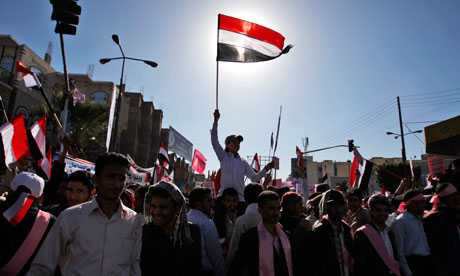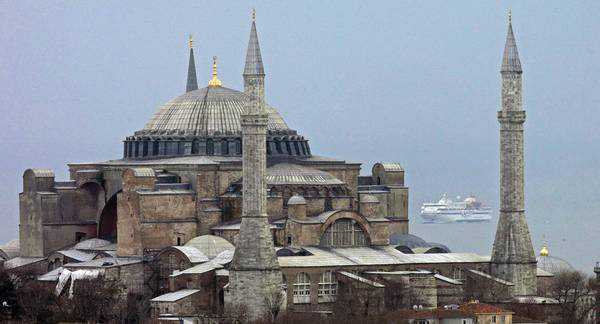Demonstrators gather on streets of Sana’a as Algeria aims to defuse tensions by lifting 19-year state of emergency
Tom Finn in Sana’a and Mark Tran

Reverberations from the mass protests in Tunisia and Egypt continued to be felt around the Arab world as demonstrators gathered on the streets of Yemen for a “day of rage” and Algeria became the latest country to try to defuse tensions by lifting its 19-year state of emergency.
More protests are expected across the region following Friday prayers, including in Syria, where activists have used Facebook to organise demonstrations in front of parliament in the capital, Damascus, and at Syrian embassies across the world.
Major demonstrations both against and in support of President Ali Abdullah Saleh took place in Yemen within a few miles of each other in a battle for hearts and minds in the capital, Sana’a.
Around 20,000 protesters, most of them young men, occupied three major roads around Sana’a University in some of the biggest anti-government protests Saleh has faced in his 32-year rule. Large-scale demonstrations also took place in other cities, including Ibb and Taiz. The nationwide demonstrations went ahead in defiance of a plea from Saleh to call off all planned protests, rallies and sit-ins.
Police opened fire and used tear gas to break up one of the marches, witnesses said, and security officials confirmed that one demonstrator was critically wounded by police fire. Two others were also reported to have been hurt in the eastern town of Mukalla.
“Together we fight against poverty, corruption and injustice,” the protesters at Sana’a University chanted, between intermittent bursts of music and speeches delivered by opposition politicians from Yemen’s Islamist, socialist and Nasserite parties.
In Sana’a, soldiers watched from rooftops as students wearing pink bandannas – a reference to the uprising in Tunisia – formed a human wall around the protesters to see off potential clashes.
“Saleh needs to form a new government,” said Mohammed al-Ashwal, the director of political affairs for Yemen’s Islamic party, Islah. “We’ve had enough of being left on the sidelines. Let the Yemeni people decide who will rule them in clean, fair elections.”
Echoing protesters in Egypt, Yemen’s opposition had planned to hold their demonstrations in Tahreer, or Liberation Square, in the heart of the capital. Government authorities beat them to it, however, filling it with marquees and sending hundreds of tribesmen to camp out there overnight.
By this morning the square was filled with thousands of middle-aged Yemeni men. Placards bearing pictures of the president were handed out to supporters and groups of men shouting pro-Saleh slogans were set off at regular intervals to parade through the streets.
“Saleh keeps this country from collapse,” said a 70-year-old man from the southern city of Taiz cloaked in a tattered Yemeni flag.
In a last-ditch attempt to appease the protesters, Saleh announced on Wednesday that he would step down in 2013 and that his son Ahmed would not succeed him. “No extension, no inheritance, no resetting the clock,” Saleh said, referring to ruling party proposals to abolish term limits that would have allowed him to run again.
Saleh, however, reneged on a similar pledge before Yemen’s last round of presidential elections in 2006. “You are tired of me and I of you. It is time for change,” Saleh told parliament in July 2005. Shortly afterwards, thousands of Yemenis protested in Sana’a, demanding the president change his mind, which he did.
In Algeria, President Abdelaziz Bouteflika was quoted by official media as saying that the state of emergency would end in the “very near future” after he met ministers. The 72-year-old leader, who was first elected in 1999, also said the government should adopt new measures to promote job creation and that state-controlled television and radio should give airtime to all political parties, the official APS news agency reported.
Bouteflika said protest marches, banned under the state of emergency, would be permitted everywhere except in the capital. The concessions followed protests last month, when several people sought to copy the fatal self-immolation of a 26-year-old unemployed university graduate, Mohamed Bouazizi, in Tunisia.
The president’s announcement came ahead of a planned march by opposition leaders, human rights groups, unions, students and unemployed workers for February 12 in Algiers. A repeal of the state of emergency and an end to a ban on new political parties were among the demands of the opposition.
The call for today’s protests in Syria has been orchestrated through Facebook, particularly on the Syrian Revolution page, “liked” by over 13,000 people.
President Bashar al-Assad has played down any prospect of contagion from Tunisia and Egypt. In an interview with the Wall Street Journal this week, the media-savvy Syrian leader said his country was stable because the government was more in tune with its people.
“We have more difficult circumstances than most of the Arab countries, but in spite of that, Syria is stable,” he said. “Why? Because you have to be very closely linked to the beliefs of the people. This is the core issue. When there is divergence between your policy and the people’s beliefs and interests, you will have this vacuum that creates disturbance.”
But mindful of the economic hardships that triggered the collapse of the Tunisian government, the Syrian government announced late last month that it had increased the heating oil allowance for public workers.
www.guardian.co.uk, 3 February 2011




